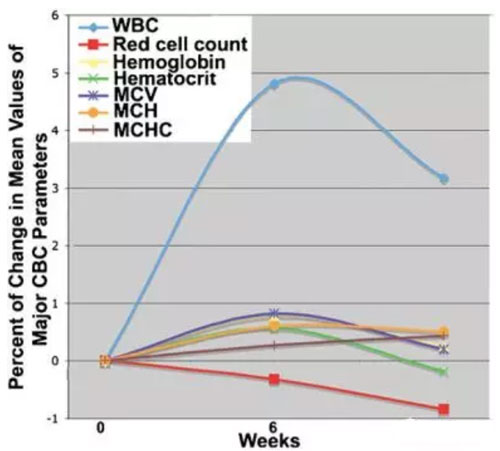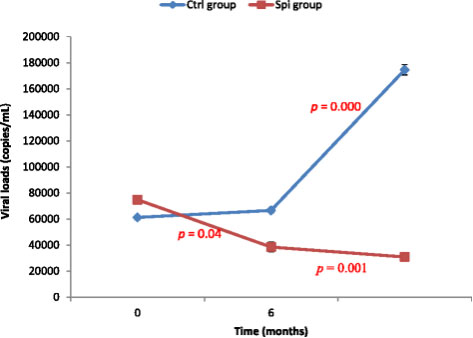|
Many studies have proved the significant role of Spirulina in regulating the immune system of animals. Qurenshi et al. (1996) found that chickens fed with Spirulina platensis had significantly enhanced humoral and cell-mediated immunity. Watanuki et al. (2006) also found the immune stimulating effect of Spirulina platensis in feeding carp (Cyprinus carpio). In a feeding experiment using mice as a research object, Balachandran et al. (2006) found that the activation of Toll-like receptor 2 dependent monocytes by Spirulina polysaccharides and its immune enhancing effect in mice.
Not only has a large number of literature reports on spirulina's immune regulation capacity been accumulated in vertebrates, but it has also been demonstrated in the study of human immune system regulation. Hirahashi et al. (2002) found that Spirulina can activate the human innate immune system: by oral administration of hot water extracts of spirulina to volunteers, it was found that the volunteers increased the production of interferon and NK cell toxicity. The elderly are the people most in need of improvement in the regulation of the immune system. Selmi et al. (2011) conducted a study on the supplementation of daily spirulina diets among 40 elderly people over the age of 50, and found that during the 12-week study period, the average red blood cell hemoglobin averages of male and female subjects were steadily increasing. . In addition, the average red blood cell volume and average red blood cell hemoglobin concentration of male participants also increased. Older women seem to benefit faster from spirulina supplements.
>  The percentage change of the average CBC of 30 subjects during the spirulina food supplement experiment at weeks 0, 6 and 12 CBC, the number of whole blood cells; MCH, average hemoglobin; MCHC, average red blood cell hemoglobin concentration; MCV, average red blood cell volume; WBC, white blood cells.
Spirulina has a good role in improving immunity and increasing resistance to viral infections, and its high-yield Phycocyanin is an important effective ingredient. Phycocyanin is a water-soluble blue pigment, and studies have found that mice fed phycocyanin have stronger immunity and reduced allergic inflammation, and concluded that phycocyanin maintains the mucosal immune system by Function to enhance biological defense activity and reduce allergic inflammation by inhibiting antigen-specific IgE antibodies (Nemoto-Kawamura, Hirahashi et al. 2004). In other studies, Spirulina has also been shown to activate macrophages, T cells and B cells (Capelli and Cysewski 2010).
 In a large study in Cameroon (Ngo-Matip et al., 2015), the researchers conducted a 12-month single-blind, randomized, multicenter trial for 169 AIDS patients. Patients were supplemented with Spirulina platensis in their daily food. During the experiment, the researchers found that the patient's CD4 cells increased significantly, and the virus content also decreased significantly after 6 months (Figure 2)
Changes in virus content in the test group. All values are averaged. Ctrl: Control group not taking Spirulina; Spi: Experimental group taking Spirulina.
In summary, Spirulina has a very good immune regulation effect on the human body and has great potential for further development and utilization. However, there have been relatively few related studies so far, and we expect larger-scale evaluations of pharmacodynamics and pharmacological mechanisms.
Reference:
1) Balachandran, P., Pugh, N. D., Ma, G., & Pasco, D. S. (2006). Toll-like receptor 2-dependent activation of monocytes by Spirulina polysaccharide and its immune enhancing action in mice. International Immunopharmacology, 6(12), 1808-1814.
2) Capelli, B. and G. R. J. N. Cysewski (2010). "Potential health benefits of spirulina microalgae." 9(2): 19-26.
3) Hirahashi, T., Matsumoto, M., Hazeki, K., Saeki, Y., Ui, M., & Seya, T. (2002). Activation of the human innate immune system by Spirulina: augmentation of interferon production and NK cytotoxicity by oral administration of hot water extract of Spirulina platensis. International Immunopharmacology, 2(4), 423-434.
4) Nemoto-Kawamura, C., T. Hirahashi, T. Nagai, H. YAMADA, T. KATOH, O. J. J. o. n. s. HAYAsHI and vitaminology (2004). "Phycocyanin enhances secretary IgA antibody response and suppresses allergic IgE antibody response in mice immunized with antigen-entrapped biodegradable microparticles." 50(2): 129-136.
5) Ngo-Matip, M. E., Pieme, C. A., Azabji-Kenfack, M., Moukette, B. M., Korosky, E., Stefanini, P., ... & Mbofung, C. M. (2015). Impact of daily supplementation of Spirulina platensis on the immune system of naïve HIV-1 patients in Cameroon: a 12-months single blind, randomized, multicenter trial. Nutrition Journal, 14(1), 70.
6) Qureshi, M. A., Garlich, J. D., & Kidd, M. T. (1996). Dietary Spirulina platensis enhances humoral and cell-mediated immune functions in chickens. Immunopharmacology and immunotoxicology, 18(3), 465-476.
7) Selmi, C., Leung, P. S., Fischer, L., German, B., Yang, C. Y., Kenny, T. P., ... & Gershwin, M. E. (2011). The effects of Spirulina on anemia and immune function in senior citizens. Cellular & molecular immunology, 8(3), 248.
8) Watanuki, H., Ota, K., Tassakka, A. C. M. A., Kato, T., & Sakai, M. (2006). Immunostimulant effects of dietary Spirulina platensis on carp, Cyprinus carpio. Aquaculture, 258(1-4), 157-163.
|
